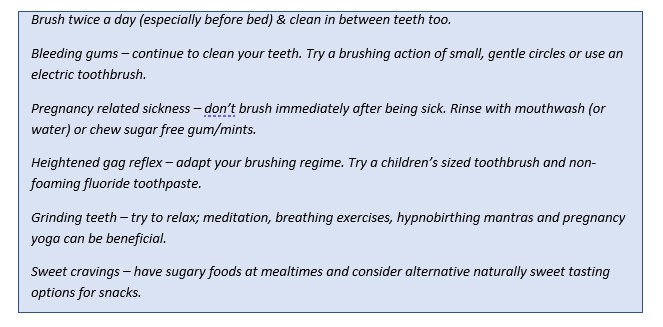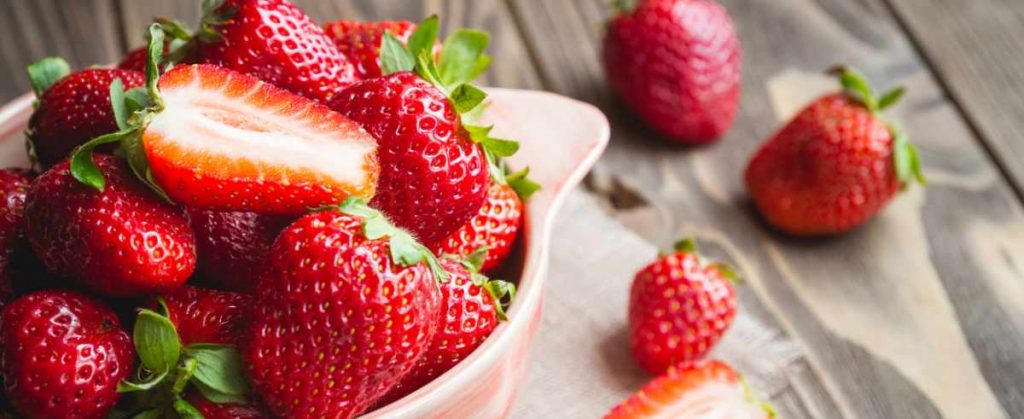Have you ever wondered exactly why you get free dental treatment during pregnancy? Well the fascinating process of growing a mini human can actually cause issues in your mouth! There are a range of oral conditions that may affect mums-to-be. Pregnancy and Maternal Oral Health is a part of your overall well-being, so it’s key to look after your teeth.


Below is a more detailed run through of some potential symptoms and ideas for how to manage these:
Bleeding gums
This is perhaps one of the most common pregnancy-related dental issues. Often related to elevated hormone levels and slight differences in your immune response whilst pregnant. Bleeding gums can be related to a number of different conditions including;
- Pregnancy gingivitis. This is simply inflamed gums and bleeding most often noted after cleaning your teeth. It is very common in the 2nd trimester and normally resolves after baby is born without causing any long term problems. To minimise the effects of bleeding gums you should try to maintain good oral hygiene. By regular brushing twice daily for 2 minutes and cleaning in between your teeth with floss or interdental brushes. You can also consider an electric toothbrush. Or if using a manual brush then the ‘modified bass technique’ (which is having the head of the toothbrush angled at 45 degrees towards the gumline) is beneficial for gum health.


- Periodontal disease. This is chronic gum disease that is sometimes worse during pregnancy. It can cause issues with the tissues and bone surrounding your teeth. It is often linked to smoking or poor brushing habits. Some studies have shown links between periodontal disease and adverse pregnancy outcomes. Including; gestational diabetes, pre-term birth, low birth weight and risk of pre-eclampsia. It would ideally managed with by a dental professional such as your dentist or hygienist.
- Pregnancy epulis. Also known as pregnancy granuloma. This is a specific localised enlargement of gum tissue, often found along the edge of the gumline, and it can bleed easily. They may disappear after baby arrives or occasionally surgical removal is suggested. If you are diagnosed with this, then maintain good general gum health alongside specific targeted cleaning advice.
Sickness
Sickness during pregnancy is super common. It can range from mild feelings of nausea, to classic ‘morning sickness’. Right through to the debilitating hyperemesis gravidarum. It may pass after the first trimester or for some it can carry on right until their baby is delivered.
As well as having implications on how you feel and what you may (or may not) be able to do, pregnancy sickness can leave an icky taste in your mouth. And if it is happening frequently this may potentially cause damage to teeth due to the acidity. Repeated acid attacks may cause erosion of the tooth’s outer enamel. This is also the case if you’re suffering from gastric reflux.
However, it is not a good idea to brush your teeth straight after vomiting. The oral environment takes at least 30 minutes to recover a neutral state. So if you brush immediately afterwards you are rubbing acid into your teeth. But these are some practical ideas to get rid of that unpleasant taste and help your mouth stabilise after sickness:
- Rinse your mouth with an alcohol-free fluoridated mouthwash
- If you can’t tolerate mouthwash then rinse with plain tap water
- You could dab a small amount of toothpaste on your finger and gently smear it over your teeth
- Using sugar-free mints or chewing gum tastes nice, stimulates saliva for cleansing and often contain xylitol which can help get eliminate certain oral bacteria.
Gag reflex
Also during pregnancy some women develop a heightened gag reflex. You may find that trying to brush your teeth, particularly the upper back molars, triggers gagging or retching. But it’s obviously important to try and maintain toothbrushing as close to normal as you can. Some suggestions for managing this include:
- Using a small-headed (or even a child’s sized) toothbrush
- Look for an SLS-free toothpaste – this is the ingredient that creates the foam, so an SLS-free one will be less foamy
- If it’s the taste of the toothpaste you can’t stand then the brand ‘Oranurse’ do a flavour-free paste
- Sometimes brushing with warm water may make you less likely to retch
- A ‘single tuft’ brush is much smaller and ideal for reaching back molars/wisdom teeth
- An electric brush with a round shaped head might help (but the vibrations can be overwhelming for some people)
- Focus on steady breathing and body awareness during brushing – wiggle your toes and feel connected to the ground
- Play some music or count numbers in your head to distract yourself
- The sickness is often self-limiting but if you are suffering please speak to your antenatal medical team.
Saliva
Increased saliva production (or ptyalism) can occur, often during the earlier stages of pregnancy. You might even find yourself drooling or needing to spit out excess. This can be a bit socially awkward or uncomfortable for you but it’s normally just a stage that passes quickly. Plus saliva provides essential protection for your teeth and aids digestion of food.
Cravings
It’s well documented that mums-to-be may experience unusual food cravings. Sometimes this includes a frequent desire for sugary items which can put you at increased risk of tooth decay. It’s important not to restrict your urges when pregnant and snacking is often a way of coping with nausea. Even if you don’t experience a specific overwhelming craving, lots of expectant mamas report altered taste sensation. Your favourite foods might not taste quite right and you may be drawn to blander choices. Ideas for managing sweet cravings include:
- Consider healthier options such as whole fresh fruits which are naturally sweet
- Good quality dark chocolate normally contains less sugar than milk or white varieties
- Nut butters are safe to consume during pregnancy
- Plain natural or Greek yoghurt with fruit toppings is nice and fresh
- Try and keep the most high sugar items to mealtimes only. Decay is to do with frequency of consumption rather than amount. Hello dessert!
- If you’re having a sugary drink use a straw to protect teeth and try to only drink at mealtimes
- Having a small amount of cheese alongside your snack helps to neutralise it
- Ginger is often touted as a remedy for sickness, but lots of ginger flavoured options are super sugary as well. But using ground ginger from the spice rack or grated fresh ginger can be a great way to include it
- Then there is the phenomenon of ‘pica’. Which is craving substances with no nutritional value such as soil or chalk. If this happens to you it can be alarming and could potentially cause damage to your teeth. But don’t panic – please discuss it with your health professional for personalised advice. And Charlotte has loads more nutritional tips for pregnancy too! And a whole blog of snack inspo here.


Grinding/clenching
Grinding your teeth is often associated with stress. During pregnancy worries about physical health, emotional and hormonal changes, plus other anxieties can lead to you grinding or clenching your teeth (known as bruxism). Especially when you are sleeping. It can sometimes lead to headaches and jaw/muscle pain. It would be a good idea to discuss this with your dentist in the future. You may need to have a mouthguard made to wear at night. Other strategies to help are:
- Managing stress. Try to create a calm environment around bedtime. Doing meditation, breathing exercises, hypnobirthing mantras and pregnancy yoga can be beneficial
- Exercises & massage. There are specific exercises that relax and stretch the muscles around your jaw joint
- Avoid excessive chewing – such as tougher foods or chewing gum to help give the jaw muscles a break
Visiting your dentist when you are pregnant
It is normally a good idea to visit your dentist during pregnancy. Even if you aren’t suffering from any symptoms. It is relevant to let your dentist know if you are expecting, even if it’s early days. Any information you share with us is totally confidential. We would offer the usual screening, risk assessment and appropriate advice. There are some aspects of dental care that may alter when you are expecting. Such as; the types of filling material, choosing to delay x-rays or postponing treatments that involve lying back in the chair for extended periods of time.
Remember though your dental maternity exemption then lasts right up until baby’s 1st birthday. Meaning you can also attend appointments after baby arrives so we can assess for any further changes and complete treatment if required. Your own dental team can establish a diagnosis and devise a suitable treatment plan. Taking care of yourself is beneficial to you and your growing baba. A baby’s own milk teeth start to form during the first trimester in a really fascinating cellular process. Then their adult teeth begin developing around birth. The better you look after your teeth the less likely you are to need input from a dentist. Prevention is best where possible!


However during the recent lockdown routine dental care in the UK, including check-ups, was suspended. Practices are now beginning to open again but for most (due to issues with PPE, risk assessment and ‘aerosol generating procedures’) this will be phased return. It is likely to be some time yet before normal service fully resumes. There may be restrictions on treatment offered due to the continuing risks around COVID-19. Urgent dental care provisions are always in place though and you can seek telephone advice from your dentist.
Hopefully the tips above will help you to carry out good oral hygiene habits at home.
Finally as children’s normal dental visits are also likely to be delayed we have loads of evidence-based advice on Looking After Children’s Teeth’ here.
This blog was written for SR Nutrition by Jemma Hook @themummydentist